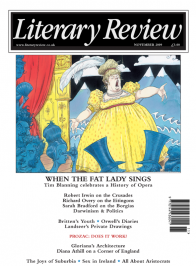Dominic Sandbrook
Regarding Henry
Kissinger’s Year: 1973
By Alistair Horne
Weidenfeld & Nicolson 457pp £20
At the beginning of August 1974, as Richard Nixon’s presidency was dribbling painfully away, he called his successor Gerald Ford in to see him. It was a tense, awkward meeting, but Nixon did offer one useful bit of advice. At all costs, he recommended, Ford should keep Henry Kissinger on as Secretary of State. ‘Henry is a genius,’ he said thoughtfully of his great collaborator, ‘but you don’t have to accept everything he recommends. He can be invaluable, and he’ll be very loyal, but you can’t let him have a totally free hand.’ Later, Nixon was even more forthright: ‘Ford has just got to realise there are times when Henry has to be kicked in the nuts,’ he told an aide. ‘Because sometimes Henry starts to think he’s president. But at other times you have to pet Henry and treat him as a child.’
Although Nixon had some decidedly eccentric opinions (his belief, for example, that the rise of dope-smoking was being orchestrated by a Jewish conspiracy), his characterisation of Henry Kissinger was not one of them. At once brooding and brilliant, self-mocking and self-promoting, impulsive and calculating, Kissinger remains one of

Sign Up to our newsletter
Receive free articles, highlights from the archive, news, details of prizes, and much more.@Lit_Review
Follow Literary Review on Twitter
Twitter Feed
It wasn’t until 1825 that Pepys’s diary became available for the first time. How it was eventually decrypted and published is a story of subterfuge and duplicity.
Kate Loveman tells the tale.
Kate Loveman - Publishing Pepys
Kate Loveman: Publishing Pepys
literaryreview.co.uk
Arthur Christopher Benson was a pillar of the Edwardian establishment. He was supremely well connected. As his newly published diaries reveal, he was also riotously indiscreet.
Piers Brendon compares Benson’s journals to others from the 20th century.
Piers Brendon - Land of Dopes & Tories
Piers Brendon: Land of Dopes & Tories - The Benson Diaries: Selections from the Diary of Arthur Christopher Benson by Eamon Duffy & Ronald Hyam (edd)
literaryreview.co.uk
Of the siblings Gwen and Augustus John, it is Augustus who has commanded most attention from collectors and connoisseurs.
Was he really the finer artist, asks Tanya Harrod, or is it time Gwen emerged from her brother’s shadow?
Tanya Harrod - Cut from the Same Canvas
Tanya Harrod: Cut from the Same Canvas - Artists, Siblings, Visionaries: The Lives and Loves of Gwen and Augustus John by Judith Mackrell
literaryreview.co.uk